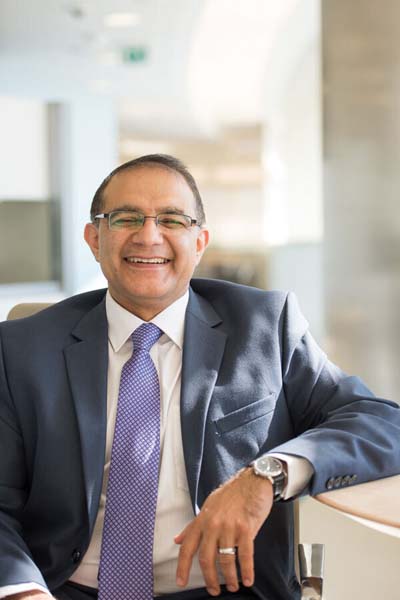Living with autism can be challenging if appropriate measures are not in place to support families, and schools are not provided with proper tools to fill educational gaps. In Doha, the burden is on families, who rely primarily on healthcare providers and private educational centres to cater to their children with special needs. Qatar is, however, preparing the ground for significant developments concerning autism.
Professor Muhammad Waqar Azeem, Chair of Qatar’s National Autism Plan Working Group, has been heavily involved in the country’s efforts to provide better services to the families of individuals with autism. In this exclusive interview, he gives Doha Family Magazine a preview of the changes to expect over the next few years.

What is Qatar’s National Autism Plan Working Group and why is it significant?
I moved to Qatar in 2015, and a number of initiatives were being developed around autism. In particular, under the leadership of the Ministry of Public Health (MoPH), the National Autism Plan Working Group was created, and I got involved right away. Brought together by the Ministry of Public Health, the Working Group included stakeholders from the private and public sector—various ministries, healthcare providers, schools, special needs centres—and, most importantly, the parents of individuals with autism. The group started working on a National Autism Plan based on six pillars: awareness in the general public and among professionals, early screening and detection, timely diagnosis, effective interventions, role of schools and transition to adulthood.
Two years and a number of meetings later, the plan is coming to fruition—Qatar’s National Autism Plan, the first of its kind in the Gulf region, was released in April 2017.
The parents being the driving force behind the Working Group and the fact that all stakeholders worked together and believed in the importance of the task at hand made it possible to develop a National Autism Plan in two years. The support of the country’s top leadership—in particular Prime Minister His Excellency Sheikh Abdullah bin Nasser bin Khalifa Al Thani, the Minister of Public Health Her Excellency Dr. Hanan Mohamed Al Kuwari, and General Secretary Assistant for Health Affairs, MoPH Dr. Salih Ali Al Mari—was also crucial.
Now that the National Autism Plan is in place, what are the next steps?
The plan has a five-year implementation timeline based on short, medium and long term goals, so that is the next step.
The plan defines success and charts how it should be achieved in each of the six pillars on which it rests. Parents of individuals with autism should expect developments in each of the pillars. These will include an increase in public and media awareness, and the creation of tailored services for children with special needs—for example, the ability to accommodate them in waiting rooms faster in various public settings—but also putting formal screening processes in place to detect autism early, and ensuring timely and accurate diagnosis. From an intervention point of view, it will be important to look at appropriate and effective interventions available around the country. Appropriate education settings and providing schools and parents with the tools they need to care for their pupils and children is also a key element. Lastly, but not least importantly, as children and adolescents move to adulthood, we need to be able to meet their needs—they may need sheltered workshops and suitable employment. Ultimately, the goal should be making each individual a productive and contributing member of society.
The National Autism Plan Working Group held its first meeting regarding implementation in May 2017 at the Ministry of Public Health. I am truly happy and the parents are genuinely excited. Pulling this together at a national level in just over two years… one would have thought it impossible.
You are obviously very passionate about this achievement…
I am. The National Autism Plan is extremely comprehensive and detailed. The best thing about it is that everybody owns it. The list of people involved is a very long one. It truly was a team effort, and all stakeholders worked together on the same level—parents, experts and top political leadership.
Are we there? Not yet. In fact, there is a long way to go, and if I look at the five-year implementation framework for the National Autism Plan, it is clear that the list of things to do is still long. For example, the plan recognises that there is a lot of work to be done around decreasing waiting times for diagnoses, ensuring proper intervention in schools and homes, and training parents. Providing training to parents is crucial so that they feel empowered. Parents—not healthcare providers —should take a leading role in directing the care for their children.
So no, we are not there by any means, but it is a great start.
There seems to be strong momentum around autism—will it continue to remain high on the public agenda?
The momentum is indeed incredible. As many as five or six conferences about autism were organised in Qatar only in 2017.
The publication of the report Autism: a Global Framework for Action, as a result of the 2016 World Innovation Summit for Health (WISH) Forum, is another key milestone for Qatar (wish-qatar.org/app/media/download/2739).
The WISH report and Qatar’s National Autism Plan are aligned—they share the same energy. For the WISH Forum, eleven experts from five continents worked together for a year to gather scientific data that can play an important role when designing policies regarding autism both on a national and international level.
Historically, it’s also worth mentioning that World Autism Awareness Day—celebrated worldwide on 2 April—was proposed to the United Nations by Her Highness Sheika Mozah bint Nasser Al-Missned in 2007.
Professor Muhammad Waqar Azeem is the Chair of Psychiatry and Child Psychiatry for Sidra Medical and Research Center. He is also Professor of Psychiatry at Weill Cornell Medical College, Cornell University. Professor Azeem served as Chair of Qatar’s National Autism Plan Working Group and Co-Chair of the World Innovation Summit for Health (WISH) Autism Forum.